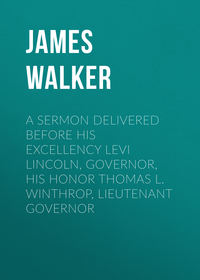This book cannot be downloaded as a file but can be read in our app or online on the website.
Read the book: «A Sermon Delivered before His Excellency Levi Lincoln, Governor, His Honor Thomas L. Winthrop, Lieutenant Governor»
COMMONWEALTH OF MASSACHUSETTS
IN HOUSE OF REPRESENTATIVES, May 28, 1828
Ordered, That Messrs. Thayer of Braintree, Goodwin of Charlestown, and Fuller of Boston, be a Committee to wait on the Rev. James Walker, and present to him the thanks of this House, for the Discourse delivered by him this day, before the Executive and the Legislature, and to request a copy of the same for the press.
Attest,
P. W. WARREN, Clerk
SERMON
EXODUS, XVIII, 21
Thou shalt provide out of all the people able men, such as fear God, men of truth, hating covetousness; and place such over them to be rulers.
The public business, the excitements of the day, and all the circumstances in which we are assembled, make it imperative on me to be brief, and almost entirely occasional. You have not come here prepared to sit down and listen to a learned discussion, fearfully long, and fearfully dull; and I do not mean you shall be troubled with one. I only ask your attention, while I throw out a few hints on the responsibility the people of this country are under, to take care that the men whom they raise to authority, are honest and capable.
In those countries where the accident of birth determines who shall rule over them, the people are not responsible for the character and capacities of the men in power. It is true, a corrupt administration is a national calamity in all governments; but in ours it is at the same time a national calamity, and a national sin. From the freedom and frequency of our elections, our public men exist but in the breath of the people; and if power is put into unworthy hands, or suffered to remain there an hour after it is abused, the people are responsible. It is a fair inference that the whole people have degenerated. It would not be fair to judge the morals of the people of England, or of France, by the morals of the court; but it is perfectly fair to judge the morals of the people of this country by the morals of the men, whom they elevate by their voluntary suffrages to represent the majesty of the nation. It is of unspeakable importance, that we should feel that we are implicated, in a manner in which no other people are in the character of our rulers and the duties resulting from this peculiarity of our constitution are weighty and solemn.
Consider too, the effect, which the political observation of a bad man will have on public opinion, and through public opinion on the public morals. We preach about conscience, the dignity of human nature, the power of religion and divine influences; and all this is well. Experience teaches us, however, that all this is nothing, or next to nothing, unless countenanced and sustained by public opinion; which fixes the practical standard in every place, and few rise much above it, or sink much below it. The history of legislation on such subjects as dueling, lotteries, and the Lord's day, shows us also, that laws, human laws, are an absolute nullity, are no better than so much blotted parchment, unless countenanced and sustained by public opinion. God forbid that I should speak of virtue as not having its foundation in human nature; still I cannot but think, that this is a subject on which we may be a little too refined, a little too enthusiastic, a little too eloquent for practical purposes. Generally and practically speaking, I believe that men are just as good, as they think public opinion requires; and no better. Let it be understood, therefore, that notorious vices will not lose a man the confidence of the people; let it be understood, that the vicious are not only tolerated, but trusted and honored, and the great practical restraint on the bad passions is compromised, and all others will be eluded, or defied.
